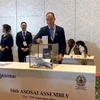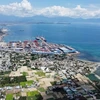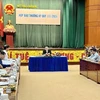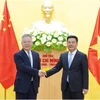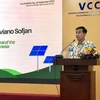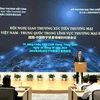The Public Finance Partnership Group (PFPG) convened a high-level dialogue in Hanoi on July 23, focusing on its 2015-2016 activities to improve the restructuring of State-owned enterprises (SOEs) and reforms of taxation and customs procedures.
Amid the ongoing economic restructuring push in tandem with shifts to new growth models, the dialogue enables Vietnamese agencies and foreign experts to learn about each other’s position on financial management, SOEs restructuring and improvement of taxation and customs formalities, Deputy Finance Minister Truong Chi Trung said at the event.
Dang Quyet Tien, Deputy Head of the Finance Ministry’s Corporate Finance Department, said 61 out of the targeted 289 enterprises have been equitised, adding that there is still much to be done to equitise the remaining.
The Asian Development Bank (ADB)’s chief economist Aaron Batten said the restructuring covers mostly small-scale SOEs.
According to the economis, most of the equitised firms have failed to publicise their financial reports, making it difficult to gauge their performance. Only 8 percent of SOEs have released financial statements on their websites, he said.
A representative from the Japan International Cooperation Agency (JICA) said equitisation is only the first step towards SOEs restructuring, adding that improving corporate governance following equitisation is a more essential step.
Tien revealed that the government has a plan to sell capital in bulk, meaning that investors with sound financial and governance capability and long-term commitments could consider the offer.
The government is also considering selling all of its capital in non-core areas to investors, he said, adding that relevant authorities will announce regulations enforcing the release of corporate information to the public.
Nguyen Minh Duc, Senior Economist from the World Bank (WB) Office in Vietnam, said taxation overhaul should rely on regulations and taxation management and that tax filing and inspection should conform to international practices.
The dialogue was co-hosted by the Ministry of Finance and the WB.-VNA
Amid the ongoing economic restructuring push in tandem with shifts to new growth models, the dialogue enables Vietnamese agencies and foreign experts to learn about each other’s position on financial management, SOEs restructuring and improvement of taxation and customs formalities, Deputy Finance Minister Truong Chi Trung said at the event.
Dang Quyet Tien, Deputy Head of the Finance Ministry’s Corporate Finance Department, said 61 out of the targeted 289 enterprises have been equitised, adding that there is still much to be done to equitise the remaining.
The Asian Development Bank (ADB)’s chief economist Aaron Batten said the restructuring covers mostly small-scale SOEs.
According to the economis, most of the equitised firms have failed to publicise their financial reports, making it difficult to gauge their performance. Only 8 percent of SOEs have released financial statements on their websites, he said.
A representative from the Japan International Cooperation Agency (JICA) said equitisation is only the first step towards SOEs restructuring, adding that improving corporate governance following equitisation is a more essential step.
Tien revealed that the government has a plan to sell capital in bulk, meaning that investors with sound financial and governance capability and long-term commitments could consider the offer.
The government is also considering selling all of its capital in non-core areas to investors, he said, adding that relevant authorities will announce regulations enforcing the release of corporate information to the public.
Nguyen Minh Duc, Senior Economist from the World Bank (WB) Office in Vietnam, said taxation overhaul should rely on regulations and taxation management and that tax filing and inspection should conform to international practices.
The dialogue was co-hosted by the Ministry of Finance and the WB.-VNA
